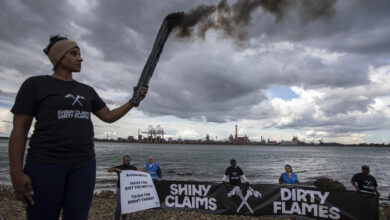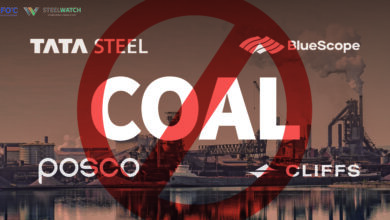Nippon Steel’s expansion into the US risks slowing climate action in steel

Tokyo, Japan
Reacting to Nippon Steel’s acquisition of US Steel, the international climate organisation SteelWatch highlights fears that Nippon Steel, renowned for slowing climate action within Japan, now jeopardises global steel decarbonisation.
Some say diamonds are forever. For Nippon Steel, coal is forever. Coal-based steel production drives over 2 tonnes of CO2 per tonne of steel, and must be phased out for a decarbonised sector. But Nippon Steel has no plans to end their coal-based blast furnace production.
Even in 2050, it plans to be running blast furnaces, with the promise of speculative technologies that – by their own admission – will cut emissions by 50% at best. Inadequate as they are, these emission reduction plans are also far too slow: implementation is scheduled for the 2040s, meaning decades of uncontrolled carbon emissions in line with 2.4 degrees of global warming plus air pollution affecting local communities.
Nippon Steel’s determination to keep coal at its core is reflected in its investment in Teck’s Canadian coal mines last month. Now, the purchase of US Steel adds 8 blast furnaces to the portfolio, 6 of them in the US, in addition to the 10 it operates in Japan.
Every steel company should have a transition plan for every blast furnace and a clear route to green steel production. But Nippon Steel is entrenching its coal plans rather than developing a timeline for cleaner direct reduced iron or creating a green iron supply chain.
The addiction to coal makes the company a blocker of climate policy too. They have been identified by Influence Map as the worst performer in a scorecard of Japanese, Indian, South Korean companies in terms of in influencing policy, opposing carbon pricing and aking negative positions on renewable energy expansion.
Nippon Steel invests effort in projecting itself as future-facing. But it’s not:
- When the company talks about harnessing hydrogen, it does not mean they have adopted hydrogen based DRI. Their ‘innovation’ is injecting hydrogen into a blast furnace. And they don’t even say this has to be green hydrogen.
- When they claim emissions reductions from 2013, that is only because falling demand has led to furnaces closing. Emissions intensity (CO2 per tonne of steel) is unchanged.
Nippon Steel’s acquisition of US Steel could be a significant drag on climate ambition in the global market, if they continue to focus on simply adding inadequate false solution technologies to blast furnaces, and maintain their negative policy stance.
The acquisition should instead become an opportunity, for Nippon Steel to step into an ambition to contribute to stable climate. The company should work with unions and local communities for transition plans for all blast furnaces. Nippon Steel could strengthen its scrap-based production technology, learning from the US. And given that US Steel is a member of Responsible Steel, it should now look at how to become a member and move rapidly towards certified steel.
“Within Japan, Nippon Steel portray themselves as an industry leader and innovator, even on decarbonisation. The reality is so very different. They are doubling down on coal-based blast furnaces production and have shoddy inadequate targets for 2050” said Caroline Ashley, Director of SteelWatch. ‘It will set back global decarbonisation if they export this coal-addiction and backwards facing mindset to their new US operations’.
For further information:
Media contact
Caroline Ashley, SteelWatch. [email protected] +44 7947 691911
Shiori Matsumoto, Asia Communications and Research Officer of SteelWatch
[email protected] +34 6138 69508
About SteelWatch: SteelWatch is an international campaign organisation established in June 2023 with a global team and global ambition. Our vision is a steel industry that underpins a thriving zero-emissions economy. We plan to bring “climate urgency” to the sector through the publication of data, strengthening of civil society voices, scrutiny of corporate performance, and direct challenge to steel companies to shift their investments faster.
Previous SteelWatch comments related to Japan’s lack of steel decarbonisation:
Will Japan Stand in the Way of Action by G7 to Decarbonize Steel?
For more information visit us at:
www.steelwatch.org LinkedIn Twitter
For all media queries, please contact [email protected]



